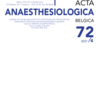Ultrasound measurement of the optic nerve sheath diameter in traumatic brain injury: a narrative review
Ultrasonography ; optic nerve ; intracranial pressure ; intracranial hypertension ; traumatic brain injury
Published online: Mar 29 2022
Abstract
Background : Raised intracranial pressure (ICP) needs to be investigated in various situations, especially in traumatic brain injury (TBI). Ultra-sonographic (US) measurement of the optic nerve sheath diameter (ONSD) is a promising noninvasive tool for assessing elevated ICP.
Objectives : This narrative review aimed to explain the history of and indications forUS measurement of ONSD. We focused on the detection of elevated ICP after TBI and discussed the possible improvements in detection methods.
Conclusions : US measurement of ONSD in TBI cases provides a qualitative but no quantitative assessment of ICP. Current studies usually calculate their own optimum cutoff value for detecting raised ICP based on the balance between sensitivity and specificity of the method when compared with invasive methods. There is no universally accepted threshold. We did not find any paper focusing on the prognosis of patients benefiting from it when compared with usual care. Another limitation is the lack of standardization. US measurement of ONSD cannot be used as the sole technique to detect elevated ICP and monitor its evolution, but it can be a useful tool in a multimodal protocol and it might help to determine the prognosis of patients in various situations.
